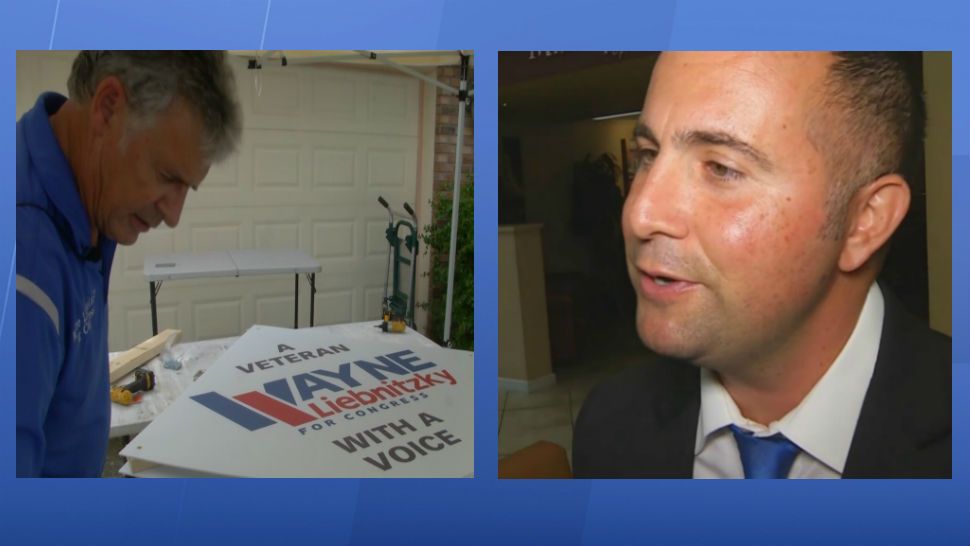KISSIMMEE, Florida — An exclusive Spectrum News poll shows Democratic incumbent Congressman Darren Soto has a narrow lead in a bid to keep his seat in Florida’s Ninth Congressional District.
- Exclusive poll shows Rep. Soto has narrow lead over challenger
- Poll includes responses from 535 likely voters
- Most salient issues for voters: economy, health care, immigration
November’s election is a rematch between Soto and Republican challenger Wayne Liebnitzky.
The two faced off in 2016 when the seat was open. Soto won by 15 points.
A Spectrum News poll, conducted by SurveyUSA, finds Soto continues to lead the race, now by just 8 points.
- 48% - Darren Soto
- 40% - Wayne Liebnitzky
- 11% - Undecided
- +/- 6.4 percentage points
The poll results include responses from 535 likely voters, surveyed between October 2, 2018 and October 7, 2018.
Florida’s Ninth Congressional District covers Osceola County and includes portions of Orange and Polk counties.
“We’ve hit tens of thousands of doors and talked to tens of thousands of voters,” Soto said. “We’re running on a strong record of bringing back hundreds of millions of dollars for disaster relief, for agriculture, for our schools, for higher paying high-tech jobs.”
“We have a very good, strong effort, we have a major push going on right now,” Liebnitzky said.
Liebnitzky says he is far more confident this time in his bid to win the seat, believing his near non-stop campaigning efforts since 2016 have helped him better connect with potential voters.
Economy, health care, and immigration remain the most concerning issues for voters.
- 18% - Economy
- 16% - Health Care
- 16% - Immigration
- 15% - Education
- 8% - National Security
Economy
Liebnitzky and Soto agree that growing the state’s economy means investing more in diversifying beyond a reliance solely on tourism.
“I look at how our district still needs more higher paying jobs, that’s an issue I hear about regardless of your background, regardless of where you are in the district,” Soto said. “Kids in our district, if we give them a quality education and healthcare, and an opportunity for a great job one day, they’ll be able to pursue the American dream one day, and that’s what really drives me.”
Soto says he has helped draw millions of dollars for high-tech job growth in Central Florida, including $30 million announced last week for a cybersecurity center in Osceola County.
Liebntizky, a Central Florida business owner, said he too believes in investments in high-tech jobs.
“When you get somebody out there who has a job, bringing home money to put food on the table, his self-esteem is up, feeding family, putting a roof over his family. I’ve got to tell you, jobs fix a lot of things,” Liebntizky said.
Liebntizky said he does not support $15 an hour minimum wage as a broad issue, in that economics do not always equally rise.
“It’s not how much you make, but it’s how much you get to keep,” Liebntizky said. “Making $15 an hour, you’re paying more for taxes, paying more for goods and services.”
Health Care
The question was posed to survey respondents: Which of the following would be the best way to fix the health care insurance system? Respondents said:
- 46% - Keep and Improve
- 30% - Repeal and Replace
- 19% - Single-payer
- 6% - Not sure
“I was never for repeal, I’ve always been a fix it; the problem is, it’s gotten so bad, it’s so punitive,” Liebntizky said. “People say ‘well three million people couldn’t get healthcare,' they didn’t talk about the millions of people who choose not to because of the high cost of premium, that, plus you double the deductible.”
“I think we have to fix the Affordable Care Act,” Soto said. “There were certain things sabotaged by President Trump. He got rid of cost sharing, so peoples’ rates went up 40 percent, so we have to get that back. We have to expand Medicaid in Florida so over 800,000 Floridians who fall in that gap can have health insurance.”
- DECISION 2018: Learn more about November’s election, including a look at the races, candidates, and ways to vote
Poll Analysis
There a stark gender gap present in the race. Democratic incumbent Darren Soto leads among women by 30 points. Liebnitzky leads among men by 19 points. There is a combined 49-point gender gap.
Liebnitzky leads narrowly among white voters, who make up 56 percent of the electorate in the SurveyUSA modeling. However, Soto leads by 21 points among Hispanics (who make up 32 percent of the electorate in SurveyUSA’s modeling) and by 29 points among African American voters (who make up 9 percent of the electorate in SurveyUSA’s modeling).
Twice as many Democrats cross-over and vote Republican as Republicans who cross-over and vote Democrat. But independents break 2:1 for the incumbent, pushing the Democrat over the top.
Liebnitzky holds 76 percent of the conservative vote; Soto holds 82 percent of the liberal vote. But, push-comes-to-shove among moderates, where Soto doubles Liebnitzky.
Voters in the district who say the economy is the most important issue in how they will vote in 2018 back the Republican Liebnitzky by 15 points. Voters who say immigration is the most important issue in their 2018 vote back the Republican candidate by 53 points. Voters focused on healthcare back the Democrat by 41 points. Voters focused on President Trump back the Democrat by 35 points. Voters focused on education back the Democrat by 54 points.




